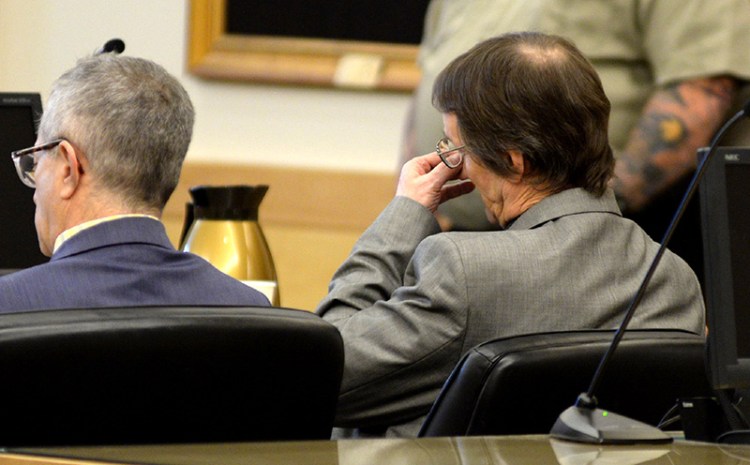BANGOR — A judge has convicted a longtime suspect in the murder of 16-year-old Joyce McLain, a high school student who disappeared while jogging near her East Millinocket home in 1980.
Philip Scott Fournier, 57, now faces 25 years to life in prison for killing McLain and leaving her body in the woods in the small mill town in northern Maine.
Fournier sat silently in a crowded courtroom Thursday morning as Superior Court Justice Ann Murray recounted the facts of the case and then announced the guilty verdict. Friends and family of both McLain and Fournier sat in rapt attention.
Fournier was led out of the Penobscot Judicial Center courtroom and returned to the Penobscot County jail, where he has been held since his arrest in 2016. The court will set a sentencing date in the coming months.
Pam McLain, Joyce’s mother, sat in the front row behind prosecutors during the hearing and smiled after the judge read the guilty finding. McLain, flanked by family, said outside the courthouse that after waiting decades for justice, she was the happiest a mother could be. McLain said she felt a variety of emotions as Murray read the extensive findings for more than an hour before announcing her verdict.
“I had a couple of iffy moments,” McLain said, before her trepidation turned to relief. “I was very satisfied” with the verdict.
McLain said she does not hate Fournier, and she empathizes with his relatives.
“I feel real bad for his parents and his siblings and grandparents and aunts and uncles,” McLain said. “And, if given a chance, I will visit with them if they will have me there.”
McLain also delivered a message to the family members of Mainers whose murders remain unsolved.
“Keep on keepin’ on,” McLain said. “I’ll be with you, because I’m not gonna end here.”
McLain declined to criticize police for their handling of the case or the delay in bringing Fournier to trial.
“I’m happy, I’m here today,” McLain said. “We got a guilty verdict. I’m not going to go into the past 37½ years.”
Daniel Hale, Pam McLain’s brother, said the family is grateful to the community for its support, and to the media for keeping Joyce’s murder in the public eye long after her death. He also said the guilty finding was bittersweet.
“We kept hearing ‘justice for Joyce,’ and ‘closure.’ For me, and I may be alone in the family, closure isn’t for us. It’s closure for Mr. Fournier. He’s going where he should have been, 37, 37½ years ago. He’s got justice now. Justice has come about and I have a lot more emotions than I ever thought I’d have.”
Hale added: “She was the love of all our lives.”

Outside the Bangor courthouse, Pam McLain hugs one of her late daughter’s best friends, Laura Shea Merrill, moments after a judge found 57-year-old Philip Scott Fournier guilty of the 1980 murder of 16-year-old Joyce McLain. Pam McLain also had a message to other families of Mainers whose killings languish in cold-case files: “Keep on keepin’ on.”
DEFENSE CONSIDERING AN APPEAL
Jeffrey M. Silverstein, Fournier’s attorney, said his client is disappointed and upset with the finding of guilt and they are exploring options for appealing, which will first require a close reading of Murray’s decision. The written decision was not immediately released after the 9:30 a.m. hearing.
Silverstein said the decision to charge Fournier, and now to find him guilty of the murder, stood in stark contrast to 35 years of police work when at no time was Fournier arrested or charged with the crime.
“We need to take a close look at her decision, because while it seemed to be well-reasoned and conceived, there also seemed to be points in conflict with one another, and so we want to take a close look at that and analyze that in the context of a new trial,” Silverstein said.
The jury-waived trial brings to a close a nearly 38-year ordeal for McLain’s family and the small East Millinocket community where the murder took place.
Joyce McLain disappeared while jogging about 7:30 p.m. on Aug. 8, 1980. Her mostly unclothed body was found two days later behind the Schenck High School soccer fields in a wooded area near a row of power lines. The back of her skull had been struck with a blunt object.
At the time of her death, McLain was a 16-year-old sophomore at Schenck. She was an honor student, a cheerleader, a musician and an athlete.
Her disappearance and the attempts by police to solve her murder were complicated by powerful thunderstorms that may have washed away evidence at the crime scene. After the discovery of her body, police gleaned no forensic evidence that connected Fournier to the scene. His conviction was based solely on circumstantial evidence and witness testimony, including from four people who said Fournier had confessed to the crime over the years.
LONGTIME SUSPECT, PRIOR ADMISSIONS
Fournier had been treated as a suspect from the start.
Hours after McLain was killed, Fournier, then 19 and drunk from consuming whiskey the night before, stole an oil truck and crashed it. He suffered a serious brain injury that left him in a coma and also damaged his memory – a fact that Fournier’s defense came to rely on in the trial, casting doubt on whether his memories and confessions were true accounts or fabrications of an injured brain.
Fournier was interviewed by police 22 times before his arrest, and despite his reported confessions to at least three people, including his parents and his pastor, he cast enough doubt on the circumstances of his involvement to avoid being charged.
Over the years, he told people at various times that he had struck McLain with a glass or ceramic power cable insulator, and that he stumbled upon her body in the darkness but did not murder her. But he still avoided prosecution, even after describing details to others that only the murderer could have known.
Maine State Police have said that the original evidence, combined with additional forensic testing, witness interviews and crime scene searches, provided the grounds for finally arresting Fournier in March 2016.
In making her decision Thursday, Justice Murray said she placed great credibility in the witness testimony of John DeRoche, who was a janitorial supervisor at Husson University in Bangor when Fournier was hired as one of DeRoche’s employees in 1989, nine years after the killing.
DeRoche met Fournier and heard he was from East Millinocket. DeRoche asked if he knew anything about McLain, Murray said.
Within minutes of the two men meeting, Fournier told DeRoche he knew all about the murder, that he was the one who killed her, and that he had not been arrested because he “beat” the 20-plus police interviews.
DeRoche came forward after state police arrested Fournier, providing another example of when Fournier’s bragging about the murder did not lead to prosecution.
Matt Byrne can be contacted at 791-6303 or at:
mbyrne@pressherald.com
Twitter: MattByrnePPH
Send questions/comments to the editors.




